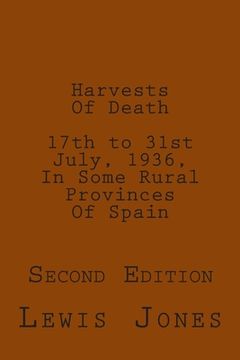Harvests Of Death. 17th to 31st July, 1936, In Some Rural Provinces Of Spain.: Second Edition. Revised, re-titled, and re-set. (en Inglés)
Reseña del libro "Harvests Of Death. 17th to 31st July, 1936, In Some Rural Provinces Of Spain.: Second Edition. Revised, re-titled, and re-set. (en Inglés)"
This book is a detailed account of armed opposition by the rural population in certain parts of Spain to the attempted take over of power by right wing military rebels in July, 1936. English language accounts of the early days of the civil war in Spain have tended to ignore, skim over, or minimise the significance of, instances of opposition to the rebels in rural parts of Spain. Consciously or unconsciously, authors have tended to replicate the pro-Nationalist (rebel) view that, in certain areas, the seizure of power by the rebels was an easy and uneventful process. A (uniformed) "walk in the park" (paseo militar). But in Galicia, it was not so. In León, in Cáceres, even in Salamanca, even in Navarra, it was not so.In "Harvests Of Death. 17th to 31st July, 1936, In Some Rural Provinces Of Spain", Lewis Jones shows, through a number of examples, that opposition to the military rebels in Spain, in July, 1936, was geographically extensive. The presence of trade unionism, the author argues, was one factor that served to make it so. The localities considered are the provinces of Burgos, Palencia, Valladolid, Navarra, Soria, Logroño, León, Zamora, the Galician provinces of La Coruña, Lugo, Orense, and Pontevedra, and the provinces of Salamanca, and Cáceres.There were those among the civilian population of Spain who welcomed the right wing insurrectionary movement headed by elements of the Spanish military, which began in Spanish controlled Morocco on 17th July, spreading to mainland Spain on 18th July. Accounts of the Spanish Civil War often depict support for the rebels as being more common in rural areas than in urban or industrial localities. In fact, in many parts of Spain, including rural areas, those from the civilian population willing to actively participate, on behalf of the rebels, in the initial stages of the insurrection were few. In rural areas, just as elsewhere, there were many who disapproved of the insurrectionary right. But all too often they were unorganised and unarmed. And people were underinformed and misinformed about events.Some thought the situation would be dealt with by loyal military and police units (the government in Madrid at first encouraged people to think this way). Yes, there were loyal troops and police. But not enough.Some thought that if they did not oppose the rebels, there would be no bloodshed. But thousands were killed, by the rebels, after they seized power.There were particular challenges for those (very often trade unionists) who sought to oppose the rebels in rural areas. Individuals had to be gathered together from across the countryside. Motor transport was not always available. Telephones were few.Even so, in rural areas of Spain, there was significant opposition to the rebels, including armed opposition.The rebel troops, as they tried to spread out from their barracks, found roads blocked, rail tracks lifted, bridges destroyed. There were well planned ambushes (as in the town of Béjar, Salamanca) and pitched battles (as at Tuy, Pontevedra, and in the Arsenal, the naval base at El Ferrol, province of La Coruña).The opposition to the rebels in Burgos, Palencia, Valladolid, Navarra, Soria, Logroño, León, Zamora, La Coruña, Lugo, Orense, Pontevedra, Salamanca, and Cáceres affected the course of events elsewhere in Spain. The main aim of the rebels was to capture Madrid. Because of the widespread opposition they encountered elsewhere in the country, the rebels could not move troops against Madrid in such numbers or as quickly as they had hoped to do.And, because of opposition to the rebels elsewhere in the country, the government forces in Asturias, Santander, and the Basque country had more time to organise and equip themselves than might otherwise have been the case.

